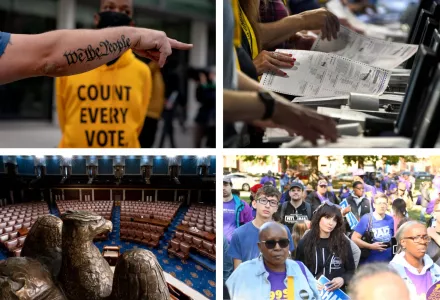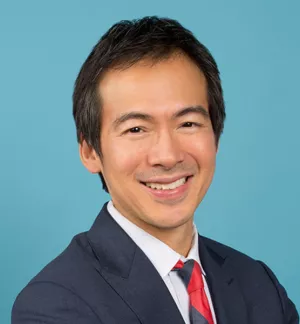
Days before the midterms, we sat down with three scholars for a conversation about U.S. democracy. The mood was anxious.
Americans will head to the polls Tuesday for midterm elections with high stakes for the future of U.S. democracy. In a conversation with the Gazette, three scholars of government and politics — Theda Skocpol, the Victor S. Thomas Professor of Government and Sociology; Archon Fung, Winthrop Laflin McCormack Professor of Citizenship and Self-Government at the Kennedy School and director of the Ash Center for Democratic Governance and Innovation; and Erica Chenoweth, Frank Stanton Professor of the First Amendment at the Kennedy School and Kenneth L. Wallach Professor at the Radcliffe Institute — shared their concerns about the U.S. political landscape, including patterns of division and hardening extremism, and the likelihood of rising violence in the months and years after the vote. The interview has been edited for clarity and length.
Q&A
Theda Skocpol, Archon Fung, Erica Chenoweth
GAZETTE: What are the biggest threats to U.S. democracy as we head into the midterm elections?
SKOCPOL: The United States has never been a pure democracy. We're a federated republic, with strong democratic components that have developed in the last century. We're in a very serious crisis, in my opinion, the most serious since the coming of the Civil War. The reason for that is there are a lot of levers that, if pulled together and combined with violence and threats of violence, make it possible for minority authoritarians who feel threatened to change the regime — really change the system — in de facto and quasi-legal ways. I point to the fact that a minority of the country — particularly those living outside of metropolitan and more racially and ethnically diverse areas — do feel profoundly threatened by the changes that have occurred in American society. They can obstruct things or even control court appointments through the Senate with a third or less of the American population. Gerrymandering is now an art and, combined with the Republican sweeps of state legislatures in 2010, allows anti-majoritarianism there, and the federal courts have really bowed out of defending any kind of voting rights and access, and, probably worse than that, may be on the verge of strengthening the hand of minority authoritarians. Combine all that with the fact that people are now threatening violence at the local election workers that most Americans take for granted and that most Americans, I think, choose between two parties according to current economic conditions. They don’t perceive the threat, and they won't perceive it until it's too late.
GAZETTE: Erica and Archon, do you agree with that? Are there pieces that you want to pick out or emphasize?
CHENOWETH: I agree with everything that Theda has said and would only elaborate on a couple of points. One is that our colleagues Daniel Ziblatt and Steven Levitsky often say that in order to have democracy, all major political players in that democracy — in this case, all political parties — have to agree on some fundamental norms. The first is that they accept the results of elections. The second is that they reject the use of violence as a legitimate part of the political process, especially in establishing who is going to govern. In the situation we're in now, the majority of candidates who won primaries in the Republican Party explicitly accept the so-called Big Lie, which is that the 2020 election result, as it's been certified, was illegitimate. They have embraced the lie that there's widespread election fraud in the United States, and further perpetuated it such that significant proportions of their party don't believe that American elections are legitimate in the cases where their preferred candidates don't win. On top of that, we have major political figures — candidates and people sitting in federal office and in state and local office — who explicitly endorsed or even participated in the attack on the U.S. Capitol that was meant to keep the incumbent president in power, despite the fact that he had lost the election. On Jan. 6, these were actually pro-government militias. Donald Trump was the incumbent president, he was in office, he had command of the major arms of government, and in my view, he incited a pro-government militia to try to complete the coup — or autogolpe, to be precise — that he was attempting. That has become not just an extraordinary, but obvious conclusion to the type of politics that had been waged over the previous 10 years in this country. The fact that it's now normal and standard, such that every election is a crisis, means that our democracy is in — like Theda said — potentially the worst political and constitutional crisis in over 150 years....
Powell, Alvin."Where are We Going, America? Harvard Gazette, November 4, 2022.
The full text of this publication is available via Harvard Gazette.




